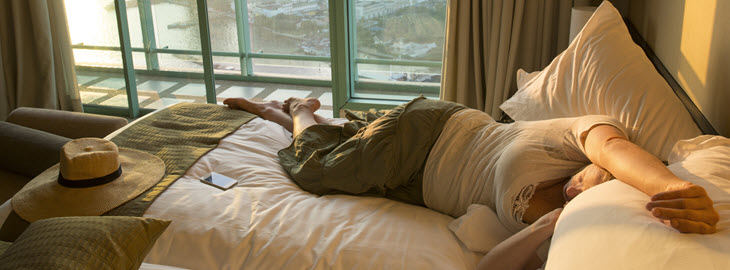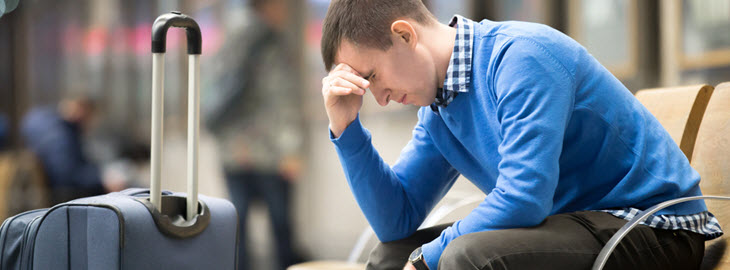
9 tips to reduce the feelings of jet lag
Traveling across time zones disrupts your sleep. But there are things you can do to minimize the strain on your body.
You’ve been counting down the days until your trip to the Mediterranean since you booked it months ago. You could barely sit still on the flight and seeing a new continent come into view spiked your adrenaline sky high.
You rush excitedly off the plane, but as you start exploring the local sites, you begin to feel off. The local cuisine looks amazing, but your appetite isn’t there. It’s hard to concentrate and your coordination is off. You’re exhausted, cranky and just don’t feel well. When you try to sleep at night, you can’t. And during the day you are fighting to stay awake.
You have jet lag. And while it’s temporary, jet lag is a legitimate sleep disorder.
What’s going on in my body when I have jet lag?
Within each 24-hour cycle, your body temperature, blood pressure, glucose and hormone levels go up and down. That’s run by your internal clock, which is linked to the light you take in through your eyes. Your internal clock can run faster or slower depending on how long you are exposed to light and darkness, and when you are exposed to each.
Typically, the amount and timing of sunlight you take in from day to day is close to the same. Even though it varies seasonally, the change is gradual enough for your body to adjust. However, when you travel by airplane and quickly cross time zones, the change is dramatic. When you arrive in a new time zone, your body is still wired to the sun patterns from your home location. You’re getting light when your body is used to it being dark, and vice versa, and that disrupts your internal clock.
If you are traveling east: It will probably be difficult to fall asleep at night. It will also take your body a little longer to adjust when you are traveling this way. The number of days you will be jet lagged will equal the number of time zones you cross. So you will be jet lagged about three days if you change three time zones to the east.
If you are traveling west: You may wake up earlier than you actually want to. But it doesn’t take your body quite as long to adjust traveling this way. The number of days you will be jet lagged will be 2/3 the number of time zones you cross. So you will be jet lagged about two days if you change three time zones to the west.
Is there anything I can do so I don’t get jet lag?
You can’t entirely prevent jet lag. But you can reduce feeling its effects. Try out these tips:
-
Start adjusting light exposure before your trip to decrease the length of time you will feel jet lagged.
You can manipulate your body clock and ease into a new time zone as quickly as possible by controlling your exposure to light and darkness before travel. You can calculate the schedule adjustment that will work best for you and your trip. And you can download a free app on your smart phone called Entrain that makes your schedule adjustment easy to follow. -
Consider taking melatonin supplements if you’re traveling east.
Melatonin is a hormone produced naturally in your brain. It is only released in darkness and signals typical nighttime behaviors. For humans, that includes sleep. Melatonin works better in low doses, so “less is more” when you’re taking supplements to help with jet lag. It also needs be taken at the proper time to be effective. Take 0.5 mg of melatonin 13 hours before the time you want to wake up. Higher doses will not help you fall asleep any faster or easier and may cause other problems. Melatonin supplements should be taken before your trip during the same time period that you’re adjusting your exposure to light and darkness. Then, stop using melatonin the day your flight leaves. -
Time your flight.
Try to schedule a flight so that the local time of your destination is close to the time you usually wake up. Many flights that cross multiple time zones are intentionally scheduled so that they land in the morning. This may mean you have to leave home at an odd time of day. Remember though, if you want to reduce the effects of jet lag, your time of arrival is important. -
Try to sleep during your flight.
Ideally, you want to wake up when your plane arrives in the morning at your destination. If you need it, you can use a sleep aid. But don’t rely on one after you’ve arrived. If you can’t sleep on the plane, stay active. Walk around and stretch your arms and legs regularly. -
Avoid short layovers in extra time zones if you can.
This can further throw off your internal clock, since you don’t have enough time to fully adjust. A non-stop flight or ones with just enough time to change planes are best. -
Say no to inflight coffee, caffeinated soda and alcohol.
Also steer clear of them at the airport bar and when you first reach your destination. Instead, drink plenty of water or other drinks that aren’t going to dehydrate you. Dehydration can worsen the effects of jet lag. -
If it’s daytime when you get to where you’re going, don’t stay inside!
Move around and be active. Get as much bright light during the morning and afternoon as possible to help your body’s clock adjust. Your stomach may not be ready for food when you first arrive but it is important to try to eat something when you usually do. This is because food also helps set your internal clock. Just be careful to avoid overeating. -
Limit naps in the days following your arrival.
If you need it, taking a short nap can help you stay awake during the day. But napping for more than 30 minutes can keep you from falling asleep at night. Try to stay awake until your normal bedtime and to get up on time the next day. -
Bring earplugs and a sleep mask.
These can help you fall asleep even if your body does not feel ready.
What other parts of travel can affect my sleep?
Unfamiliar sounds
If you’re staying in a big city but are used to a quiet country or suburban life, noise might keep you awake. So, packing earplugs might be a good idea. Similarly, if you’re from the city but are headed out of town, the absence of noise might make it hard for you to sleep. Using a white noise app on your phone or running a fan can help.
Stress
It’s common for people to get stressed because of the change in routine that comes with travel. If you’re staying in a hotel, request two wake-up calls. That way, you don’t lose sleep worrying you’ll miss one. And, it will help you get up in the morning at the correct time.
Weather
Most people have a hard time sleeping if it’s hotter than 75 degrees, or colder than 65 degrees. If you’re headed somewhere cold, consider packing an extra warm blanket. If your destination is hot, wear light, breathable clothing. And if there’s no air conditioning available, try these tips.
Altitude
It takes a few weeks for your body to get used to altitudes of 13,200 feet or more. And anything more than 6,000 feet can be tough if you have breathing problems. Less oxygen in the air makes it harder to breathe, and that can affect your activity as well as your sleep. Try to sleep at a lower altitude than where you spend your days. Stay hydrated, sleep on your side and use a humidifier at night if possible.
About Colleen Bazzani, CCSH, RPSGT
Colleen Bazzani is a certified clinical sleep health educator and a registered sleep technologist at Methodist Hospital. She has worked at Park Nicollet since 1983, and spends much of her time educating schools, civic groups and work places about sleep health. When she isn’t out in the community, she is in the sleep clinic helping patients on CPAP therapy and other sleep-related issues. Collen enjoys walking, gardening, traveling and spending time with her family and grandson.



